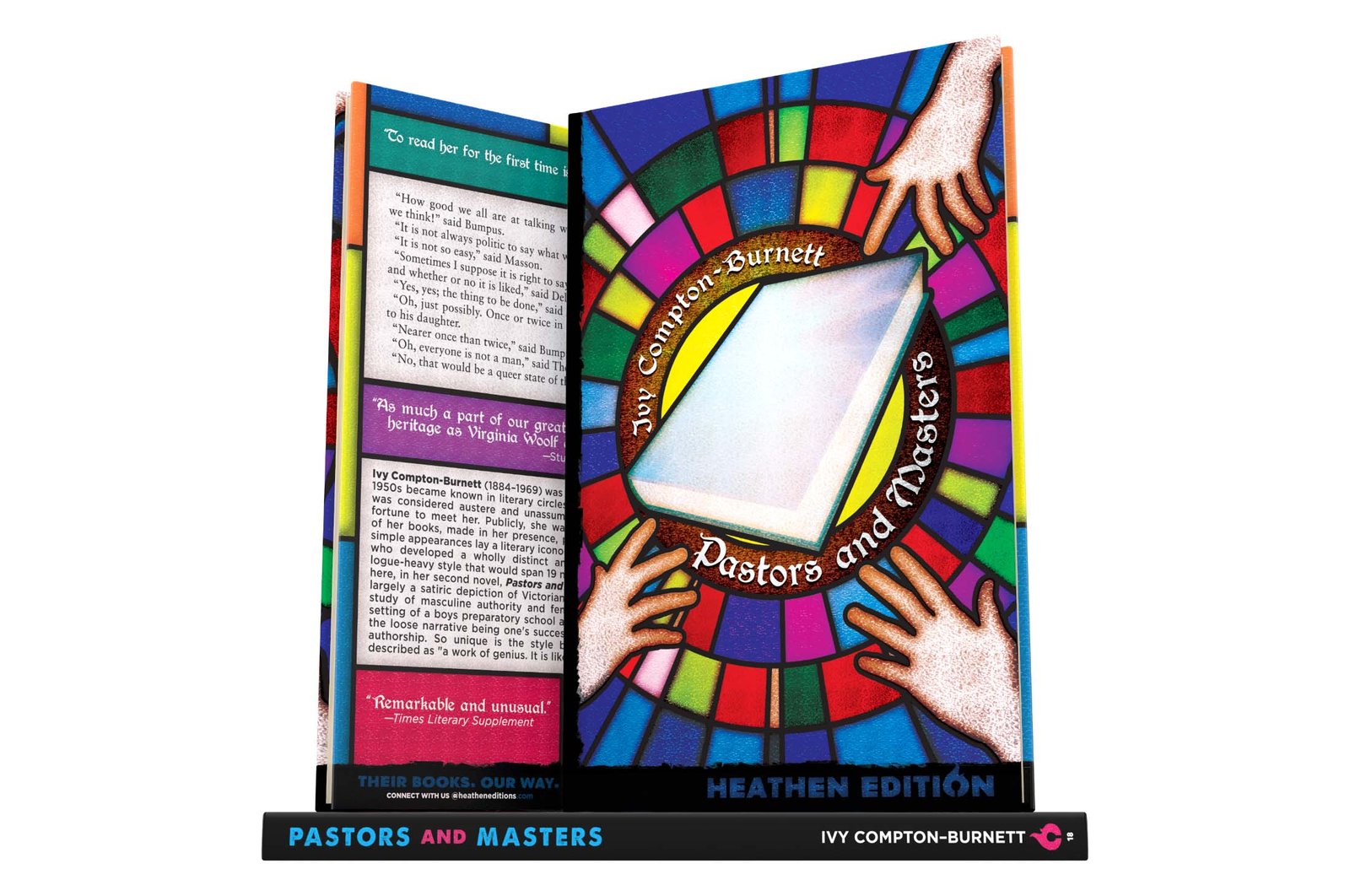No products in the cart.

Pastors and Masters
Spine #18
Author
Ivy Compton-Burnett
Translator
First Edition
1925
Heathen Edition
May 2, 2021
Refreshed
November 29, 2022
Pages
128
Heathen Genera
Talky
Paperback ISBN
978-1-948316-18-7
Hardcover ISBN
978-1-963228-18-2
“How good we all are at talking without ever saying anything we think!” said Bumpus.
“It is not always politic to say what we think,” said Miss Basden.
“It is not so easy,” said Masson.
“Sometimes I suppose it is right to say it, whether or no we like it, and whether or no it is liked,” said Delia.
“Yes, yes; the thing to be done,” said Miss Lydia, sighing.
“Oh, just possibly. Once or twice in a lifetime,” said Mr. Bentley to his daughter.
“Nearer once than twice,” said Bumpus.
“Oh, everyone is not a man,” said Theresa.
“No, that would be a queer state of things,” said Miss Basden.
Ivy Compton-Burnett (1884–1969) was a reclusive novelist who in the 1950s became known in literary circles as “the English Secret,” and was considered austere and unassuming by all who had the rare fortune to meet her. Publicly, she was so modest that any praise of her books, made in her presence, pained her. But hidden under simple appearances lay a literary iconoclast with a biting, acerbic wit who developed a wholly distinct and highly individualistic dialogue-heavy style that would span 19 novels. A style first introduced here, in her second novel, Pastors and Masters. A short work that is largely a satiric depiction of Victorian institutions, and a character study of masculine authority and female subservience within the setting of a boys preparatory school after World War I. The crux of the loose narrative being one’s success as defined by way of novel authorship. So unique is the style borne here that it has been described as “a work of genius. It is like nothing else in the world.”
Test Your Might
Paperback
OTHER RETAILERS
Rate & Shelve It
Hardcover
OTHER RETAILERS
Rate & Shelve It
"To read her for the first time is a singular experience.”
Hilary Mantel
Heathenry
Contents
Praise
Details
Heathenry
Where to begin? Let us start with how to properly pronounce her surname, as it should be as clipped and precise as her dialogue: “Cumpton-Burnit.”
To be fair, we were, at first, pronouncing it incorrectly, so if you’re new to Compton-Burnett’s work, then hopefully we just saved you a sigh and an eye-roll when you casually drop her name into your next literary conversation—because once you finish this book, we know you’re going to want to talk about it!
Again, if you’re new to her work, this book will be unlike any that you’ve read before. The narrative is so sparse that closer parallels could be drawn to plays or screenplays. Even she knew how challenging her novels could be: “Once you pick up a Compton-Burnett, it is hard not to put it down again.”
However, there are rewards to be found in the pages ahead, dear reader. The secret, we believe, is in finding the rhythm of her writing. You’ll know once you’ve found it—because you’ll be laughing.
Regarding the text, its short length means there wasn’t a need for us to edit much. We have updated a few hyphenated words to their modern equivalents (to-day is now today, good-bye has become goodbye, and so on). And as Compton-Burnett was English, we have retained all of her original British spellings. Even our customary footnotes are few. In this instance, we believe that’s a good thing as it will allow you to focus solely on the writing.
Remember: find the rhythm.
Contents
Heathenry: A Note on the Text
Pastors and Masters
Pastors and Masters
Praise
“Miss Compton-Burnett is totally unlike any other novelist. Wit and melodrama have never been so combined before, and the combination is a brilliant success . . . She is a unique figure in modern English literature.” —Philip Toynbee
“There is nobody in all this writing world even remotely like her.” —Norman Shrapnel, Guardian
“It is in Pastors and Masters that we first come on a unique style that keeps all descriptions, except of characters’ physical appearances, to a minimum, and makes dialogue always the mainspring of the narrative.” —Francis King, The Spectator
“A remarkable and unusual novelist, who has, in her own well-tilled field, no rival and no parallel.” —Times Literary Supplement
“As for Pastors and Masters, it is astonishing, alarming. It is like nothing else in the world. It is a work of genius . . . The canvas is crowded; the conversation is close-packed; the unconscious self-revelation of the characters extraordinary. No quotation could do this book justice; the flavour is in the whole; and it is worth discovering there.” —New Statesman
“. . . she fills her matchless dialogue with utterly unpredictable remarks, she flits from sense to nonsense, she swings you around and around until, helpless and happy, you hope she’ll never let go.” —W. G. Rogers
“The single most powerful force at work in the English novel in the generation following James Joyce and Virginia Woolf.” —Raymond Mortimer
“Ivy Compton-Burnett is one of the most original, artful and elegant writers of our century. To read her for the first time is a singular experience.” —Hilary Mantel
Details
Pastors and Masters
Heathen Edition #18Format: Paperback
Interior: Black & White on Cream Paper
Pages: 128 (+2 POD)
Language: English
Annotations: 14 Footnotes
Illustrations: 11
@heatheneditions #heathenedition
Copyright © 2025 Heathen Creative, LLC. All rights reserved.
